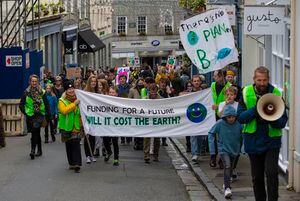Now this is a crisis
Here’s a puzzle for you. How to reduce your greenhouse gas emissions by 57% from 1990 levels in the next eight years. Don’t know? You’re in good company, says Richard Digard

WHEN I heard Environment and Infrastructure president Lindsay de Sausmarez declare that Guernsey could be a global force for good when it comes to climate change, I must confess my heart sank. After all, how many times have we heard our various leaders declaring that the island is/could be world-class in this or that?
Why should we? you immediately wonder. At what cost and for what benefit?
In fairness to Deputy de Sausmarez, she was speaking about the role we can play through green finance. There, the ‘prize’ is immense. While developing states in the south are pressing Western nations to contribute $100 billion in annual funding, the Stern Review on the economics of climate change puts the external cash requirement at closer to $1 trillion every year for the rest of this decade.
That’s a colossal sum and it’s not coming from governments – they don’t have it. Instead, it’s coming from private global capital, where this island really has a part to play.
So if Deputy de Sausmarez’s committee confines itself to that, she will have my full support. My fear, however, is that the island – or those responsible for its policy decisions – won’t be content with a bare minimum, pragmatic approach.
Don’t get me wrong. No one who saw the leader of Tuvalu standing thigh-deep in the sea around his eroding island delivering a virtual address to COP26 could be unaware of the urgency of combating climate change.
But while China, Russia and Brazil refuse to take the situation seriously, nothing this island does, or doesn’t do, will make much difference. Yes, we all have a part to play – but it’s how we choose to do that which is all-important.
Guernsey’s biggest greenhouse gas emissions come from*, in order, transport (29%), electricity generation (17%), domestic and commercial heating (11%) and industrial use (10%).
In all, the island released rather less than 400,000 metric tonnes of CO2 equivalent in 2018 – significant when you consider how little gas weighs, but trivial compared with the 5.1 billion tonnes from America alone in 2019 or 33 billion tonnes from the world as a whole.
My point here is not to say do nothing – far from it – there are, happily, probably fewer climate change deniers now than anti-vaxxers – but to ask how you reduce the 113 tonnes of local transport CO2 to nothing and who pays.
For instance, while the island is legislating for a target of net zero emissions (or carbon neutrality) in relation to greenhouse gases by 2050, it has an interim target of reducing such emissions by 57% on 1990 levels by 2030.
That’s not far away, and while the 1990 figures were way higher, knocking 60% off that still leaves us a tidy challenge, even at today’s reduced levels.
That’s especially the case since no one knows what they’re supposed to do now, while there’s still eight years’ grace to play with. Can I buy a hybrid and do my bit that way? How does, say, Creasey’s reduce its energy footprint to comply?
If you’ve one of Guernsey’s many thousands of elderly properties with no real insulation, how do you afford to bring it up to a standard where a heat pump can truly replace your oil boiler?
And as an especially scary thought, one recent estimate says CO2 emissions fell by just 17% when much of the developed world locked down for Covid and have now bounced back to pre-pandemic levels.
States’ Trading Supervisory Board member Nick Moakes wondered in these pages the other day whether wind power was an option for the island. In my lay terms, yes and no.
Turbine technology is now plug and play, so decide what output you require and bingo. While the wind blows, that is, and if you don’t mind an array off the north coast. But why should aesthetics get in the way of mitigating climate change?
Anyway, official policy is to spend up to £100m. on a further cable link with France which, while a reliable way to date of keeping the lights on and decarbonising electricity here, has never been more politically exposed, as President Macron seeks to establish himself as the strong homme of Europe.
My biggest fear is that we’ll simply mess up the whole transition and the States will dump the cost on Mr and Mrs Guernsey.
Look at it this way. We can’t balance the books now and tax increases are powering down the track to cover past profligacy. The States’ accounts can’t be taken at face value and we have substantial debts and liabilities, excluding the States employees’ pension fund.
Yet now, housing, which has, on and off, been a problem/crisis (depending on economic cycle) since the Nazis were sent packing is now back firmly in crisis mode. Yep, we’ve had more than 70 years to ensure islanders are decently and affordably housed, blown that entirely, and now want to move on to saving the planet.
Well, not quite. But hitting Guernsey’s own interim carbon target by 2030 will not be pain- or cost-free, yet neither you nor I have a clue how that’s supposed to happen, what we’re required to do or what happens if we can’t afford to take the prescribed steps.
And that’s in the knowledge we have to do at least as much again in the following 20 years to 2050, when the island has pledged to have net zero emissions. That’s supposing, of course, the worsening climate crisis hasn’t dragged the deadline forward.
So there you have it. A proper crisis, 76 years after the last one, but this time with all the warning in the world and what, exactly, to show for it?
Yes, we have Mitigate Climate Change – States of Guernsey Climate Change Policy & Action Plan, which was approved by the States in 2020. But if you’re like me, you won’t have a clue what it means in practice.
Worse, neither do your deputies. It’s not in the top 10 Government Work Plan priority actions and the predecessor Future Guernsey Plan was merely aspirational about setting it as an ‘area of focus’.
So buckle up folks. The crisis we’re in but barely responding to is going to be particularly unpleasant.
*Based on rounded 2018 figures





